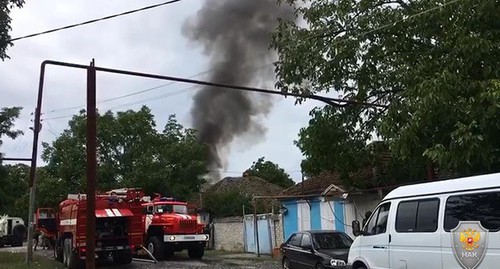
21 October 2020, 11:39
Rights defenders treat refusal to give out bodies of those killed in Ingush CTO as illegal
The Lolokhoev brothers and Aslangirei Gadaborshev, who were killed by law enforcers in counterterrorist operations (CTO), had not been brought to justice for any terrorist activities; therefore, the refusal to give their bodies out to relatives for burial is illegal, experts believe.
The "Caucasian Knot" has reported that on August 23, in the village of Troitskoye, law enforcers conducted a CTO, in which, according to their information, three supporters of the "Islamic State" (IS, a terrorist organization banned in Russia by the court) were killed; and two law enforcers were wounded. According to the Ingush National TV and Radio Company (NTRK), the casualties were identified as Magomed Saraliev, Aslangirei Gadaborshev and Ibragim Lolokhoev, while Isa Lolokhoev and Sharip Saldaev were killed in the CTO conducted on August 17-18 near the village of Galashki, Sunzha District. According to special services, they had planned terror acts. Law enforcers refused to give their bodies out to relatives.
In the opinion of Magomed Mutsolgov, the head of the MASHR Human Rights Centre, the long-term practice of refusing to give out the bodies of suspected militants killed in CTOs testifies to the inhumanity and senselessness of measures to prevent terror acts.
When Yunus-Bek Evkurov was the head of Ingushetia, the bodies of those killed in special operations, as a rule, were given out to their relatives, but there were exceptions, said Tamerlan Akiev, the head of the Ingush branch of the Human Rights Centre (HRC) "Memorial".
"The most resonant cases, when relatives tried to get the bodies of killed militants through the court, were the 'case of 55 militants', killed in 2005 during the attack on Nalchik, and the case of Aslan Maskhadov, the leader of Chechen separatists. In their attempts, relatives reached the European Court of Human Rights (ECtHR), which found that relatives' rights had been violated; however, they still haven't been told where their relatives were buried," Mr Akiev has added.
This article was originally published on the Russian page of 24/7 Internet agency ‘Caucasian Knot’ on October 21, 2020 at 05:09 am MSK. To access the full text of the article, click here.
Author: Alikhan Mamsurov Source: CK correspondent




